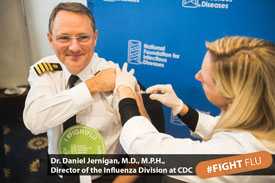Flu Fighter: Dan Jernigan
Meet flu fighter Dr. Daniel Jernigan, Director of CDC’s Influenza Division. Dr. Jernigan brings high levels of energy and commitment to CDC’s Influenza Division. These characteristics inform the way his teams operate on a daily basis. At the heart of all of CDC’s influenza work is the drive to make meaningful contributions that can protect the public’s health from flu. There also is a spirit of science-based innovation—seen in the transformative innovations of CDC’s surveillance, laboratory, and pandemic preparedness work. Dr. Jernigan leads CDC’s effort in understanding and detecting flu in an effort to stay one step ahead of it.
Name: Daniel B. Jernigan, MD, MPH
Title: Director of CDC’s Influenza Division
Location: Atlanta, GA
-
What role do you play in fighting flu?
I direct CDC’s Influenza Division which monitors influenza viruses globally in order to prepare and protect against them. Among other activities, on an annual basis we contribute heavily to the selection of vaccine viruses for the seasonal flu vaccine used each year in the United States. -
What is the most rewarding part of your work?
I am at the helm of a legion of flu fighters who contribute their expertise and passion every day with one mission in mind: to prevent and control the spread of influenza, a disease that kills hundreds of thousands of people globally and tens of thousands of people in the United States every year. Annually, our contributions to the seasonal flu vaccine result in thousands of lives saved, and tens of thousands of hospitalizations prevented in the United States alone. -
What is the most difficult part of your work?
The virus. Influenza viruses are constantly changing; evolving away from seasonal flu vaccines we use to prevent them. The changing nature of the influenza virus means that we – together with other leading flu labs all over the world – are in a continuous race to track and monitor the virus and update the seasonal vaccine accordingly. -
How serious is flu? What should people know about the risk of flu?
Influenza can be a very serious disease. In the United States, millions of people get sick, hundreds of thousands are hospitalized and tragically thousands or tens of thousands die from flu each year. Even healthy people get seriously ill from flu every year, but people who are very young, the elderly, pregnant women and people with certain underlying health problems are at high risk of serious flu complications. CDC recommends everyone 6 months of age and older get vaccinated annually. -
What would you say to those who are hesitant to get the flu shot?
The flu shot is safe and cannot give you the flu. While the vaccine varies in how well it works, it is the best way modern medicine currently has to prevent influenza; a virus that can cause serious complications including hospitalization and even death. Getting your flu shot not only protects you from the flu, but also helps protect the people around you.
- Page last reviewed: October 3, 2017
- Page last updated: October 3, 2017
- Content source:
- Centers for Disease Control and Prevention, National Center for Immunization and Respiratory Diseases (NCIRD)
- Page maintained by: Office of the Associate Director for Communication, Digital Media Branch, Division of Public Affairs


 ShareCompartir
ShareCompartir


